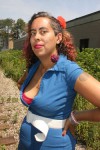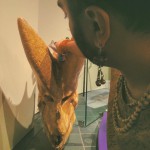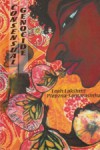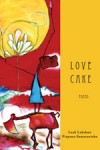In Conversation with Leah Lakshmi Piepzna-Samarasinha
by Usman Mushtak
Usman Mushtak: Just before I read your most recent chapbook, Bodymap, I finished reading Consensual Genocide, your first collection of poetry published in 2006. Do you feel your recent work is different from your poetry in Consensual Genocide? How do you see your growth as an artist, activist, writer, and femme reflected in Bodymap?
Leah Lakshmi Piepzna-Samarasinha: I love this question! Thank you for the attentiveness you’ve shown to my (working class, femme, disabled, Sri Lankan, mixed) writer’s work. To answer: oh, definitely. First books are first books. Which doesn’t make them bad, just…. first books. I feel so tender about Consensual Genocide, and loving – and I’m definitely in a different place in my writing and life then than I am now. So much of that book is about documenting, in a really raw and (I hope) political way, what I survived. I was really focused on mapping the damage, because when I wrote those poems, I was early on in my survivorhood and the work was about documenting what I’d been told I would die if I told – the abuse, the ways color and race played out in my family, and on a more macro level, documenting racism in the immigration system, 9/11 centered Islamophobia and fascism and endless war. As well as wanting to tell Sri Lankan stories at a historical moment when it felt like no one gave a fuck about us but us.
I remember blurting out to Suheir Hammad, the brilliant Palestinian feminist poet I was really, really lucky to have as my teacher at VONA in 2005, “I want to learn how to write love poems, but I don’t know how.” Studying with Suheir was one of the biggest blessings all ways, but one of the things I was in awe of her about was her ability to document both genocide and war against Palestinian people, but also love and transformation. Studying with her made me want to learn how to do that. It’s a big art, being a femme of color poet both writing to document and witness what your communities are surviving and not surviving, that is ignored every day in the media, and to document the love.
I think this, as well as doing work with Poetry for the People (the program June Jordan founded at UC Berkeley), with Mangos With Chili, with Sins Invalid, with my lovers and friends, all fed that. Moving back to Oakland meant moving into a world that was less about running away and rebuilding from the ruins. I started to want to document not just the damage, but how I healed. What came after and during the damage. Love Cake has a lot of poems about those kinds of healing- how I healed sexually from incest, how the love that the QTPOC in my community were building was healing. With Bodymap, it’s going even further, and much of that is based on what I have learned about working to love my body unconditionally from the disability justice movement and communities I am lucky to be part of.
U: While reading Bodymap, I continuously reflected on your poems as stories. It seems there is a deeply personal story behind “love you like a 7am Healthy San Francisco free MRI”, for example, about your chosen family and supporting a member (members?) of your chosen family as they navigate access to healthcare, deal with their bodies, and struggle with the effects of oppression on their bodies/minds. The lines “saying yes I’m his sister yes, I’ll stay in the room during the procedure” sound like something you’ve said in your life. What is it about storytelling or stories that attracts you? That makes you create poems? How does your poetry relate to the quote you included from Lidia Yuknovitch: “The key is, make up shit. Make up stories till you find one you can live with?”
L: I am really focused as a writer around writing to document and witness queer and trans of color lives, femme lives, working class lives, survivor lives, mixed lives, Sri Lankan lives. That moment in that poem was about accompanying a close friend, someone who was chosen family to me, to his free MRI through San Francisco’s health care for poor people program, taken to manage a chronic illness. I wanted to document a very queer people of color with disabilities experience: going with your friend to their appointment that will take all day, and having to dress to pass as respectable and lie that you are biologically related.
Stories create the world. Seeing stories that look like your own, that you’ve never read written down before, or that are stories you’ve never thought of before that change your whole idea of what is possible, are a big revolutionary deal. Diane Di Prima said, “The only war that matters is the war of the imagination,” and she’s right. Every revolutionary change happened because someone imagined a new crazy story that felt really good. The stories we make up become the amazing lives that save us and our communities. My therapist says, “Don’t tell yourself scary stories.” My poems are my stories of the freedom dreams I want for me and us. The alternative to the scary stories of we all die, everything is fucked, we stay in abuse land forever and never heal, we are alone and desperate. They are prayers.
U:I felt there was “tender love” in many of your poems, especially towards fellow femmes. In “Badass Resilience Black and Brown Femme Survivor Affirmations” you write “I trust myself,” “I love myself unconditionally (no matter what), and “I have the power to have my heart’s desire” among other affirmations. At the same time, I felt deep anger in many of your poems. In “femme is for free” you write “femme is for a fist / at the heart / of the white supremacist capitalist colonialist ableist patriarchy / a bullet / from a zip gun.” What is the relationship between deep anger and tender love in your work? And has that relationship changed for you over the course of your work?
L: They’re two sides of the same coin. A lot of my poetry is grounded in a hard femme aesthetic of seeing the world. Myself and one of my best friends, Chanlle Gallant, are working on a piece, tentatively entitled Mean Bitch Blues. I’ve been thinking a lot about how being a poor or working class-raised or -living femme is about a delicate balance of toughness and a particular kind of vulnerability that’s like wildflowers growing up in rust belt vacant lots. To me, anger makes tenderness possible. Audre Lorde said, “Anger is a useful emotion. It shows you when something is wrong.” Anger is often thought of as destructive or negative, but it can be a beautiful, powerful creative force. It’s funny, I don’t even think of that line above as particularly angry – just clear.
U: I loved reading the poem about your father! It was my favorite poem to read in your chapbook because I love reading stories of our elders and parents, about queerness in their lives, about the loneliness of their lives. Your poem made me think of my own fractured relationship with my father. What was the process of writing that poem, or others in which you reflect on the “queerness” of our elders? What do you think queerness looks like for our parents/first generation of immigrants?
L: Thank you! That poem came to me all in a rush during a Persona Poem workshop at the 2011 Asian Pacific Islander Spoken Word and Poetry Summit held in the Twin Cities. The workshop was facilitated by an amazing younger APIA female spoken word artist whose name I am blanking on right now. I think it was something about being in a specifically APIA space – when we went to read our poems out loud, almost all of us had written about our parents!
I know a lot of Sri Lankans who agree that many of our parents and elders had loving and/or sexual relationships that were queer. I feel like it’s been very common in Sri Lankan culture for male-assigned folks to get married but to have sex with men or other queer folks on the side. My father once told me, when we were drinking in the basement when I was 22 and I was coming out to him (again), “Well, what do you think I did before I married your mother? You do whatever you want, you just get married.”
It’s hard because there are so many stories we’ll only ever know part of. My father is a fashionista who had a best friend who was always described as “very pretty,” a man of color from Trinidad he lived with in London for years, who was “so upset” when my parents got married. This sounds queer to me, and I am going to lean into my queer sense…but it’s not something that most of us get to know 100%. I think the one thing that we can say is that the queerness of our parents and grandparents is there, and lives in complexity. Did my father love my mother? Probably. Was he also sexually and romantically attracted to men? Probably.
U: I feel the city of San Francisco is a character in your poems, in its interactions with you. What is it about San Francisco that attracts you? That makes you write about it?
L: It’s more the Black and Brown of Oakland and the east bay than San Francisco, but totally. I think of the Bay as the city of dreams. Like so many queer and transgender people of color, runaways and freaks, I moved to the Bay in 2007 because of its reputation as a queer and trans of color haven and dreamy free space. All of the QTPOC, all of the time, all of the art, politics, new ideas, magic, feelings. There’s something about the physical openness of the space, the beauty of the land and the buildings, the sky and the water, the way the food tastes so damn good, the way your eyes are drawn to the hills and sky, plus the funk and grit, the histories and current realities of Black and Brown Brilliant resistance, that makes new things feel possible. I love Toronto forever, and I was freaked the hell out the first chunk of time in the Bay – because it’s all true, my block did smell like good weed 24-7 and my college which isn’t even that hippie had goats that mowed the lawn and the bodega had hot links and also a 2 for $6 kombucha special and I knew people named Manatee and Kale – but being close to the big dreamy ocean was something I had longed for all my life.
And there’s also the heartbreak of Oakland. That big space of pleasure and possibility that felt sort of accessible even for folks who didn’t have wealth or trust funds and is now being attacked so hard by Google and tech. I know so many folks who have had to move away or who are fighting so hard against being pushed out. The openness also brings the bad side of the bubble, where it can be too many feelings all of the time. It’s everything at once.
U: In your poem “Bodymap,” you write “maps can be rewritten, rewrite my body.” What are the connections between maps, bodies, and storytelling for you?
L: I like the idea of the body being full of stories. Somatics is a form of healing that comes from the Greek root soma, “the body in its radiant wholeness” and talks about the ancestral memories and memories of both trauma and resilience. I feel like this shit is what I’ve been writing about my whole life – mapping and telling the stories my body holds. Getting involved with disability justice and the amazing conversations we’re having made me want to map my body’s stories of disability, madness and chronic illness, tell some stories of sick and disabled queer community life. Maps are a way of saying what’s there and navigating it, right? I’ve also had some really transformative, beautiful loverships and I wanted to tell those stories that lived in my body.
U: In your work (including Bodymap), there are connections between bodies, desire, and class. That’s especially apparent in “because sometimes, if you fuck me really good, I will write you a
Poem.” You write “you know us blue collar girls, we want products for our labour. meat in the seat. you know how to make the most out of 2.2 hours 2 pairs of knuckles and a borrowed bed.” Through the rest of the poem you also talk about “working class manners” and cars that “smell like hot cunt and dirty queer sex.” Can you articulate some of those connections between bodies, desire, and class in Bodymap and your work generally?
L: Uh, yes. Thank you for noticing that. I think my poetry is really grounded in working class aesthetics and it’s interesting who notices that, who even knows that that is a thing and who just completely misses it – because working class and poor people don’t write, right? Marge Piercy, who was one of my earliest influences (and is a white, Jewish, working class queer writer from Detroit) said once that one thing about working class writing was how it piles up a lot of details, activity, action in a small space. It makes every moment count. This comes from how our lives are crazy action packed and how we work small, tight spaces full of beauty and intensity. There’s not a lot of 400 page novels where barely anything happens written by working class disabled queer people of color. Sometimes, despite having been exposed to middle class and wealthy folks through the queer community and through being a scholarship kid at school, I kind of forget that not everyone has basically the same experience as I have, or less money, and then I’m like, ooooohhhh, you think I’m mean! Or you have an aesthetic of sensitive delicate passive aggression you think defines what ‘polite’ is. I really appreciate writing that captures poor and working class folks’ ways of writing, talking, living, loving, sex, disaster, survival, the usual. And I try to contribute to it.
I just wanted to add that Bodymap, the full-length book, is out in March 2015 on TSAR/ Mawenzi Books, and a pre-order link is here! To see a long (and evolving) list of launches and events, go to brownstargirl.org
Notes:
1. Femme is a term used by many feminine-identified queer and/or trans* people though not all feminine-presenting queer and/or trans* people self-identify as femme. Kim Katrin Milan presents an overview of Femme identities & Femmephobia: https://prezi.com/cu49lcuoligo/in-fierceness-vulnerability-deconstructing-and-resisting-femmephobia/
2. QTPOC refers to Queer and/or Trans* People of Colour. A more detailed note on the term QTPOC is available on the Reveries & Rage Tumblr: http://reveries-rage.tumblr.com/QTPOCnote
![]()
 Leah Lakshmi Piepzna-Samarasinha is a queer disabled Sri Lankan femme writer, performer, and teacher. The author of the poetry collections Consensual Genocide and the Lambda Award–winning Love Cake, as well as co-editor of The Revolution Starts At Home: Confronting Intimate Violence in Activist Communities, her work has been widely anthologized. Her new book of poetry, Bodymap is forthcoming in March 2015 from Mawenzi House; her first, long awaited memoir, Dirty River, is forthcoming fall 2015 from Arsenal Pulp. brownstargirl.org
Leah Lakshmi Piepzna-Samarasinha is a queer disabled Sri Lankan femme writer, performer, and teacher. The author of the poetry collections Consensual Genocide and the Lambda Award–winning Love Cake, as well as co-editor of The Revolution Starts At Home: Confronting Intimate Violence in Activist Communities, her work has been widely anthologized. Her new book of poetry, Bodymap is forthcoming in March 2015 from Mawenzi House; her first, long awaited memoir, Dirty River, is forthcoming fall 2015 from Arsenal Pulp. brownstargirl.org
 Usman Mushtak is a writer & migrant justice activist based in Ottawa (unceded Algonquin Territory). As a writer, he’s interested in intersectional histories, magic, and story-telling in communities of colour.
Usman Mushtak is a writer & migrant justice activist based in Ottawa (unceded Algonquin Territory). As a writer, he’s interested in intersectional histories, magic, and story-telling in communities of colour.






Good interviewer questions…the whole interview gave a good glimpse into Leah Lashkimi’s work ..thanks !